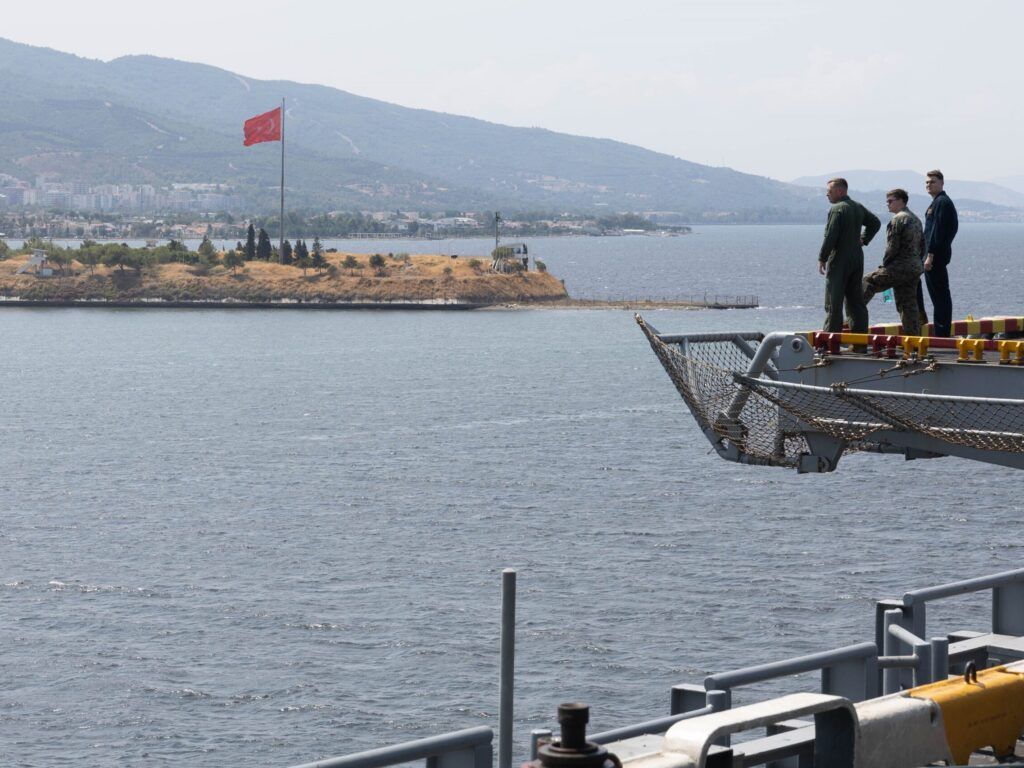Turkish-American defense and energy partnerships suit the new transatlantic landscape
Turkish-American defense and energy partnerships suit the new transatlantic landscape

The week following last November’s US elections, the newly formed American Turkish Business Roundtable (ATBR) gathered in Istanbul for a press event where ATBR directors, General Jim Jones and General Tod Wolters (both retired and both former SACEURs), addressed the impact of Donald Trump’s election victory on US-Turkey relations. At that moment, bilateral ties were strengthening, primarily through defense partnerships in response to the ongoing war in Ukraine. The announcement of a joint venture between Repkon and General Dynamics, known as Repkon USA, to manufacture 155 millimeter ammunition for Ukraine underscored both the fragility of the US defense industrial base and the advantages of accelerating the partnership with Turkey and deepening its role in NATO’s supply chain.
The consensus at the Istanbul meeting was clear: The US-Turkey relationship was poised for further improvement. This expectation was based not only on the historically positive relationship between President Recep Tayyip Erdoğan and President Trump, but also on their shared approach to foreign policy: pragmatic, transactional, and focused on strategic economic and security interests. Yet, four months later, the transatlantic security landscape has again undergone a dramatic shift.
Trump’s foreign policy signals a shift toward burden sharing among NATO allies, prompting European nations to assume greater defense responsibilities and reconsider US defense partnerships. This shift has forced European leaders to take greater responsibility for their own security needs, significantly increasing pressure on NATO members to boost defense spending to 5 percent of gross domestic product—a level that many European governments had previously resisted. As a result, European defense markets are undergoing a transformation. European countries, once heavily dependent on the United States for defense procurement, are now directing increased defense spending toward their domestic industries rather than US firms. This is evidenced by the decline in US defense stocks and the rise in European defense stocks in recent months.
For US defense firms, this presents both a challenge and an opportunity. If American companies want to remain competitive in the European market, they might be well-served to partner with Turkish firms to access European domestic procurement programs. Turkish defense firms, already well-integrated with NATO supply chains, provide an ideal platform for US companies to keep a foothold in Europe. Turkish manufacturers like Baykar, Aselsan, and Roketsan produce cost-effective, high-quality systems that European nations increasingly need. The Repkon USA partnership is just the first step, and other joint ventures could enable US firms to leverage Turkey’s industrial base while meeting Europe’s demand for non-American suppliers.
Over the past month, European defense stocks have outperformed US defense stocks due to concerns over NATO’s future following Trump’s remarks suggesting the United States might not defend allies that do not meet spending targets. This has driven European nations to accelerate defense investments, with spending projected to rise dramatically. Countries across Europe are prioritizing domestic production to reduce reliance on US suppliers, while Turkey is expanding its defense industrial base and exploring partnerships with US firms. As a result, US defense companies are seeing declines in value amid expectations that European nations will shift procurement away from direct US purchases in favor of European suppliers.
Turkey’s role as an energy hub and regional leader is becoming more critical, serving as a key transit point for resources from Iraq, the Caspian region, and the Eastern Mediterranean to Europe. The expected reopening of the Iraq-Turkey Pipeline (ITP) and the potential expansion of Trans-Caspian energy routes further reinforce Turkey’s strategic importance. In March, Turkey reinforced its regional energy leadership as Energy Minister Alparslan Bayraktar met with Iraqi Prime Minister Mohammed Shia’ al-Sudani to discuss resuming Kurdish oil exports and exporting Basra oil via the Iraq-Turkey pipeline. With the United States revoking Iraq’s waiver to import Iranian electricity, talks also focused on expanding Turkey’s electricity and gas supplies to Iraq. In Erbil, Bayraktar and Kurdistan Region Prime Minister Masrour Barzani agreed to remove barriers to Kurdish oil exports through Turkey’s Ceyhan port. These efforts reflect Turkey’s strategy to deepen regional energy ties and enhance regional energy security. As US firms look to offset margin pressures at home, investment in Turkey’s energy sector will only increase, aligning with Ankara’s ambitions to diversify its energy partnerships and solidify its role as a key transit hub for Europe.
The Trump administration’s focus on reducing inflation by lowering oil prices has also had significant consequences for global energy markets. As expectations for cheaper oil rise, many US producers are hesitant to expand domestic drilling, knowing that lower prices will reduce their profit margins. Instead, US energy firms are seeking new markets abroad, with Turkey, Iraq, and Libya emerging as key investment destinations. Recent deals underscore this trend, including the Continental Resources-TPAO partnership, which will explore and develop unconventional energy resources, and the ExxonMobil-BOTAS liquified natural gas agreement, which expands gas trade between the two countries.
The US-Turkey relationship is evolving in response to shifting transatlantic dynamics in defense and energy. The withdrawal of US financial and intelligence support for Ukraine amid Trump’s ceasefire push, later restored, pushed European nations toward self-reliance, creating both risks and opportunities for American defense firms. To maintain access to European defense markets, US companies will need to adapt by forming strategic partnerships including with Turkish firms. At the same time, the changing energy landscape is driving American energy firms to invest in Turkey and the broader region, ensuring continued economic ties between the two nations. While geopolitical tensions remain, defense and energy cooperation offer a pragmatic path forward for US-Turkey relations in this new era.
Few things are simple in US-Turkish relations, and the current environment presents obstacles as well as opportunities. Tariff effects on transatlantic trade remain uncertain in the first half of 2025, including in the area of defense industrial cooperation, though for now it seems the 10 percent tariff on Turkey may end up being relatively advantageous compared to some markets. The instinct to localize and nationalize industrial production in both the United States and Turkey represents something of a headwind for larger projects. Domestic political unrest in Turkey may also create caution in Washington or hesitance among US firms out of concern over instability impacting Turkish markets or suppliers.
Yet these concerns, while real and significant, do not outweigh the glaring and growing need that prompted formation of the ATBR. Greater US-Turkey engagement is essential for maintaining US strategic influence in NATO, European defense markets, and regional energy security; that engagement also facilitates supply chain resilience and surge capacity for future military contingencies.
Congress would be wise to support deeper defense industrial cooperation, including joint production agreements, to keep US firms competitive in Europe and engaged with Turkey. Strengthening US investment in Turkey’s energy sector would bolster transatlantic energy security and reduce reliance on adversarial suppliers. Additionally, renewed high-level diplomatic and security dialogues would help counterbalance Russian and Chinese influence while ensuring long-term US economic and security interests. A stronger US-Turkey partnership is not just beneficial—it is in many ways a strategic necessity.
Source : Article written by Gregory Bloom, a senior advisor at the Atlantic Council’s Scowcroft Center for Strategy and Security and a nonresident senior fellow at the Atlantic Council’s Turkey Program. He also serves as the chief operating officer of Jones Group International (JGI).
---
Related keywords : US-Turkey relations, Turkey US defense cooperation, Turkish defense industry, Invest in Turkey defense sector, Turkey energy hub, Turkey-Europe energy corridor, Turkey-US energy partnerships, supply chain Turkey, Transatlantic strategic partnerships, Industrial localization in Turkey, Defense market Turkey, European defense strategy, Turkey foreign investment, US companies in Turkey, Turkey regional energy leader, Strategic business consulting Turkey, American firms Turkey partnerships, Turkish-American business, Advantis Turkey defense energy













